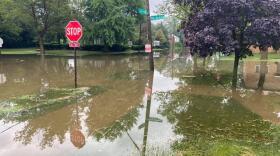The intense rainstorms and flooding that wreaked havoc on southeast Michigan last month are a sign of things to come with climate change—and President Joe Biden’s infrastructure plan will jumpstart a new generation of water systems that can better deal with that.
That was U.S. Environmental Protection Agency administrator Michael Regan’s message during a stop in Detroit Thursday night. Regan said the city's wastewater treatment plant, the nation’s largest on a single site, itself needs at least $40 million in upgrades over the next five years.
Regan said the President’s proposed infrastructure package will help make a down payment on that. He said the plan would allocate $50 billion for climate resiliency, and another $55 billion to upgrade aging water systems, including replacing all the country’s remaining lead pipes.
“We need for the bipartisan framework to become a reality, so that EPA can distribute these funds, [and]so that we can not put Humpty Dumpty back together the same way every time, but build a climate resilient infrastructure that protects people, creates jobs and protects our planet,” Regan said.
Regan was flanked by leaders from Metro Detroit’s Great Lakes Water Authority, Detroit Mayor Mike Duggan, and several of Michigan’s Democratic Congresswomen, who also called for urgent infrastructure investments.
Rep. Rashida Tlaib (D-Detroit) said communities most burdened by pollution and “environmental racism” need particular attention.
“I don't want 10-year, 20-year plans. I want to see movement in direct payments to frontline communities like this within two years,” Tlaib said. “That's what we need now.”
Rep. Debbie Dingell (D-Dearborn) said she’s experienced flooding at her home multiple times. She called for state and regional leaders to come together over the issue, which she said has no geographic or political boundaries.
“We know we've got a broken, outdated infrastructure that can compete with any third world country in the world, which is something we should never be proud of,” Dingell said. “We need to fix it, but then we need to have a plan.”
Dingell said she’s requested that the U.S. Army Corps of Engineers devise a plan for strategic water infrastructure investments in southeast Michigan.







